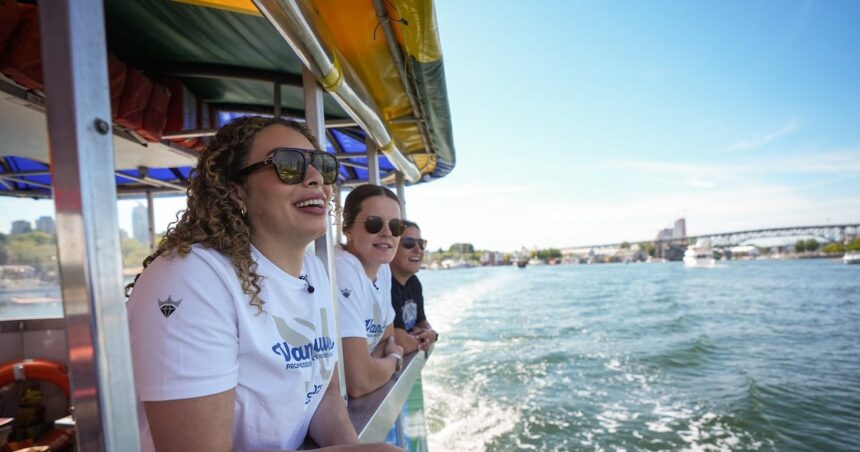The packed press conference at Rogers Arena buzzed with anticipation as Sarah Nurse, Olympic gold medalist and world champion, was officially announced as the newest star to join Vancouver’s Professional Women’s Hockey League (PWHL) franchise. With cameras flashing and journalists eagerly waiting, Nurse’s arrival marks not just a significant acquisition for the team, but a watershed moment for women’s hockey in Western Canada.
“This is a dream realized,” Nurse told the crowd, her Olympic gold medal glinting under the lights. “To play professional hockey at the highest level, in a world-class city like Vancouver, represents everything we’ve been fighting for.”
The significance of Nurse’s signing cannot be overstated. As one of the most recognizable faces in women’s hockey, she brings not only elite talent but also star power to a league determined to establish firm roots in the professional sports landscape. Her journey from young player with limited professional opportunities to Olympic champion and now PWHL cornerstone reflects the remarkable evolution of women’s hockey over the past decade.
Vancouver’s PWHL team, still awaiting its official name and branding, has strategically built its roster around Nurse and fellow Olympian Natalie Spooner. This one-two punch gives the franchise immediate credibility and recognition in a competitive sports market. For General Manager Cammi Granato, a pioneer in her own right as one of the first female scouts in the NHL, securing Nurse represents a major coup.
“Sarah embodies everything we want this franchise to represent,” Granato explained. “Elite skill, leadership, perseverance, and a commitment to growing the game. Her impact will extend far beyond the ice.”
Indeed, the ripple effects of Nurse’s arrival are already evident. Season ticket inquiries have reportedly surged since her signing was rumored, and youth hockey programs across British Columbia are preparing for what coaches are calling “the Sarah Nurse effect” – an anticipated boost in girls’ registration numbers.
What makes this moment particularly poignant is the context from which it emerges. The PWHL rises from the ashes of failed attempts to establish sustainable professional women’s hockey leagues. The collapse of the Canadian Women’s Hockey League in 2019 forced many elite players, including Nurse, to join the Professional Women’s Hockey Players Association (PWHPA), essentially a player-led movement demanding better conditions and compensation.
“We stood together when there was no league at all,” Nurse reflected. “There were moments when playing professionally in Canada seemed impossible. Now we’re not just playing – we’re building something that will last for generations.”
The Vancouver franchise will play home games at UBC’s Doug Mitchell Thunderbird Sports Centre, with select showcase games at Rogers Arena. This hybrid approach reflects both practical considerations and ambitious growth plans. League officials project sellouts for the Rogers Arena games, which would establish attendance records for professional women’s hockey in Canada.
For young female players across British Columbia, Nurse’s arrival transforms abstract possibilities into concrete aspirations. Twelve-year-old Maya Tran, who attended the press conference with her youth team, clutched a well-worn Team Canada jersey with Nurse’s number.
“I can watch her play every week now, not just during Olympics,” Tran said, her excitement palpable. “And maybe someday I could play here too.”
The economic impacts extend beyond hockey. Tourism Vancouver estimates that each PWHL home game will generate approximately $500,000 in economic activity, with showcase games potentially doubling that figure. Local businesses near both venues are already developing promotional strategies tied to game days.
As she concluded her remarks, Nurse acknowledged the weight of the moment while embracing its possibilities.
“This isn’t just about hockey games. It’s about creating something sustainable, something that proves women’s sports can thrive commercially while inspiring the next generation,” she said. “Vancouver is ready for this team, and we’re ready to make history here.”
As the PWHL prepares for its inaugural season, the addition of Sarah Nurse to Vancouver’s roster serves as both validation of the league’s potential and a reminder of how far women’s hockey has come. The question now isn’t whether professional women’s hockey can survive in Canada, but rather how quickly it can grow into the major sports property its athletes and fans have long envisioned.
For more on developing sports stories, visit our CO24 Culture page or check out the latest in sports industry trends.










